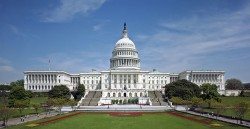
On Wednesday, lawmakers in the U.S. House of Representatives voted against an amendment that would have rescheduled marijuana and facilitated much-needed research on the plant’s medical values. The amendment aimed to remove restrictions on marijuana research by placing the plant and its derivatives in a new schedule, Schedule 1-R, which would have allowed for research to be conducted on marijuana’s benefits and risks in treating diseases such as cancer or post-traumatic stress disorder.
The amendment had sponsors on both sides of the aisle: Democratic Representatives Earl Blumenauer (OR) and Sam Farr (CA), and Republicans Andy Harris (MD) and Morgan Griffith (VA). Despite being sponsored by a bipartisan group of representatives, the amendment was defeated in a vote which the Washington Post describes as a reflection of “national Republicans’ uncertainty” in regards to marijuana law reform.
The proposed amendment was regarding H.R. 6, the 21st Century Cures Act, a piece of federal legislation introduced “to accelerate the discovery, development, and delivery of 21st century cures, and for other purposes.” The amendment would have removed several of the obstacles faced by medical researchers, not only by placing marijuana into a new schedule, but also by encouraging the National Institutes of Health to work with the Drug Enforcement Administration in studying the plant’s medical potential in treating “diseases such as cancer, epilepsy, glaucoma, and post-traumatic stress disorder (PTSD.)”
While medical marijuana is legal in almost half of U.S. states — and the District of Columbia — the federal government still considers it a Schedule I drug, meaning it does not recognize its medical benefits. This classification makes it difficult, if not impossible, to conduct reliable scientific studies on medical marijuana in the United States; and as a growing number of states are allowing for its use, these studies are increasingly in demand. This dilemma has prompted both proponents and opponents of medical marijuana to find common ground in supporting the amendment:
Whereas Harris sponsored the measure confident that the research would prove marijuana is bad, Griffith has become convinced that there are limited circumstances in which marijuana has medical benefits for patients.
“We let doctors use heroin derivatives, barbiturates and all kinds of nasty stuff that I wouldn’t want people to use recreationally. Why not study marijuana?” Griffith, still smarting from the unraveling of the amendment, said in an interview.






